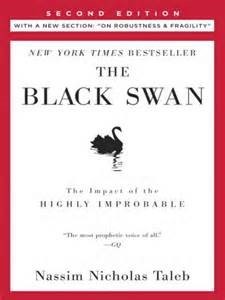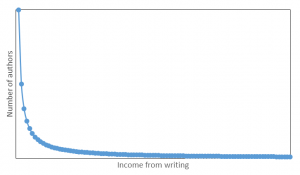My question is, once you understand how the Black Swan relates to writing fiction, will you be so dejected that you’ll abandon any idea of becoming an author?
 Nassim Nicholas Taleb wrote The Black Swan: The Impact of the Highly Improbable and it was published in 2007. A statistician, the author was trying to get readers to think about low-probability events and our estimation of their risk.
Nassim Nicholas Taleb wrote The Black Swan: The Impact of the Highly Improbable and it was published in 2007. A statistician, the author was trying to get readers to think about low-probability events and our estimation of their risk.
He defined a black swan event as having three properties: (1) it is very rare, to the point of being almost impossible; (2) it has a huge impact on people, either positively or negatively; and (3) people do not (or cannot) predict it in advance, but after it occurs, everyone sees that it should have been predicted since it was obvious all the time.
By the way, Taleb chose the metaphor of a black swan because most swans are white, and black ones are very rare. In fact, people were convinced that all swans were white, until proven wrong. That’s part of Taleb’s point. If a rare event hasn’t occurred today, or yesterday, or for your entire life, you come to believe it cannot happen. Since black swans have a massive impact when they do occur, there is a huge difference between impossible and improbable.
I read the book about two and a half years ago, but I recall Taleb discussing success in writing as a black swan event. For our purposes, let us define success by the amount of money earned from writing. Success in writing, therefore, is rare, has a huge impact on a few writers, and is difficult to predict in advance but obvious afterward.
Taleb would conclude that if we could compile the relevant accurate statistics, the resulting graph would look like this:
 The vast majority of authors earn very little money, while very few earn a large income from writing.
The vast majority of authors earn very little money, while very few earn a large income from writing.
Why is that? I believe Taleb would say that an author’s income is related to the popularity of his or her books. That popularity is determined by readers when they hear about the book, learn that their friends like it, and when they read it and recommend it to others.
People hear about books from various media outlets, so the media plays into book popularity. Luck has a role too, since poorly written books sometimes become bestsellers despite the writing quality.
Let’s say you’re an aspiring author, and let’s assume all the above is true. Does it depress you to know how much the odds are stacked against your success? Does it make you want to give up on your dream?
If you truly are writing for the money, there are things you can do to position yourself for the black swan. You can become really good at marketing; you can seek out (or pay for) media attention. You can practice your writing until you become more skilled at it.
No guarantees come with any of that, but your odds of success will improve a bit. The trouble is, you could strive for years, doing everything right, and still not achieve success because that intangible luck eludes you. That’s disheartening.
Alternatively, you could redefine what success means for you. You could decide you’re not after money, but seeking the pure enjoyment of writing, or the thrill of seeing your name in print. That’s a much more probable event, not a black swan at all.
Still, it’s my hope that the black swan of financial success from writing pays a visit soon, to both you and—
Poseidon’s Scribe
